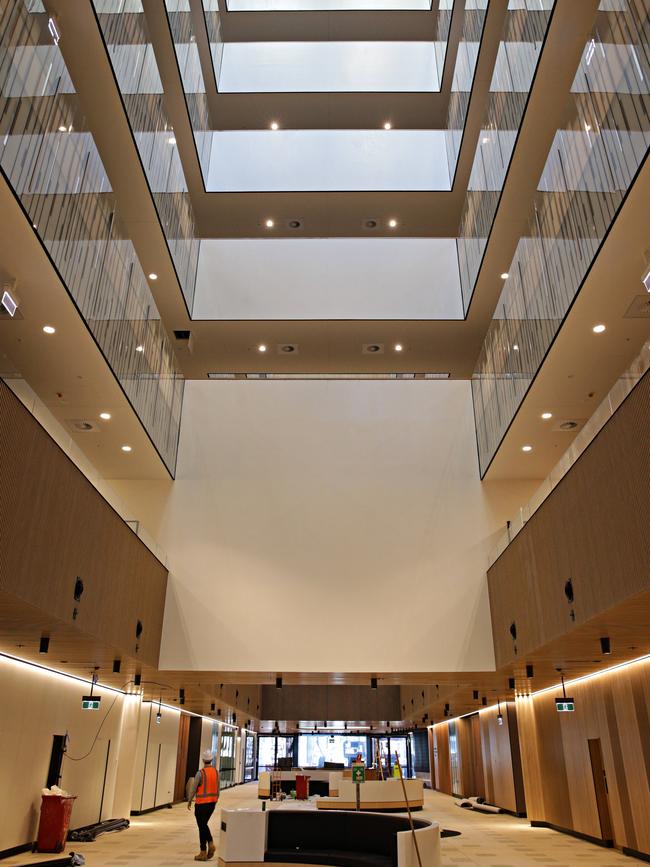Healthscope taps into AI to read patients’ minds and better gauge emotions
Healthcare companies have joined the AI gold rush, with Australia’s second-biggest private hospital operator harnessing the technology to better detect patient moods like joy and anger.
Australia’s second-biggest private hospital operator, Healthscope, is using artificial intelligence to read patients’ minds.
The company – which Canadian investment titan Brookfield took over for $4.4bn in 2019 – has partnered with Adoreboard to better gauge patients’ emotions like trust and anger.
Adoreboard is a tech company spun out of Queen’s University Belfast and its partnership with Healthscope is understood to be a world first by a private hospital.
The AI platform works by analysing patient surveys – eliminating the need to manually read each comment. Crucially, it automatically links the emotional intensity expressed in any unstructured text, enabling executives to prioritise decisions to drive better patient and business outcomes.
The hospital group has completed a three-year study into the AI platform and say its results reveal the platform could spark a 13.9 per cent in how patients rate their care and treatment.
Healthscope is the latest healthcare company to join the AI gold rush – which has the potential to fuel a 10 per cent surge in global GDP in the next decade – with CSL, Cochlear, Sonic and ResMed all exploring or using the technology.

Healthscope national manager for reported experience and outcomes Anita Hodge says hospitals rely on data from devices, including heart or blood pressure monitors, every day to understand the vitals of patients.
But Ms Hodge said that information only reveals part of the story, and going beyond the numbers to “understand patient emotions and each individual story” now plays a key role to better understanding how to improve patient experience.
“Before deploying the predictive insights platform, we had a significant challenge of manually reviewing patient comments. Not only has this been removed, but we can also now link emotions like joy, trust to anger to themes that matter most to patients,” Ms Hodge said.
“In this way, we can prioritise what we action and the likely impact of this improvement on the patient experience. Understanding the next best action to improve patient experience has been most impactful.”
Adoreboard‘s technology automatically analyses the text and links the emotional intensity of what is being communicated to a theme such as the food and meal experience. The AI platform then makes a prediction if Healthscope resolves such issues.
Ms Hodge said patient experience includes everything from admissions processes, to the food patients eat, to the bedside manner of clinicians to patients being discharged. She said by improving factors such as these, evidence from clinical studies have shown this leads to better patient outcomes.
Healthscope national director of clinical governance, Damien Lloyd, said understanding emotion is critical for the patient relationship and application of Adoreboard have taken this to a new level of insight.
“To enable patient centred care, it’s important we capture crucial moments for enhanced experiences. The results on improving operational indicators from deploying Adoreboard have been both impressive and impactful to the business and frontline clinical staff,” he said.
The technology is now being used across all 38 Healthscope hospitals in Australia – which include Melbourne Private, Northern Beaches Hospital in Sydney and Brisbane Private – and already has analysed more than 400,000 surveys from patients in real-time.
Adoreboard which is a Gartner Cool Vendor in Customer Analytics using Artificial Intelligence is used by some of the world’s most well-known brands including Procter & Gamble, Allstate and Amazon.
Its partnership with Healthscope comes as Sonic Healthcare – which has a market value of $14.3bn – has made several investments in the technology, saying it would provide a “step change” in delivering efficiency, quality and capacity in coming years.
The pathology giant backed artificial intelligence start-up Harrison.ai’s $129m Series B funding round in 2021, acquiring a 20 per cent interest in the group and forming a separate joint venture called franklin.ai.
Sonic chief executive Colin Goldschmidt has branded it a “big step forward” in delivering modern medicine and making diagnosis for a range of conditions more efficient.
Sleep apnoea behemoth ResMed has also been testing its own AI platform. CEO Mike Farrell said the technology would free nurses from performing menial tasks in monitoring sleep health – a handy development given Australia is battling a chronic nurse shortage, with a projected shortfall of 85,000 by 2025.
Meanwhile, Cochlear, which has a $16.85bn market value, has partnered with Google and Australian audiology researchers to adapt technology similar to what film director Peter Jackson used to restore audio in The Beatles’s Get Back documentary to help people hear again.
CEO Paul McKenzie said in August that CSL was looking at a suite of solutions – including AI – to make plasma collections more efficient.
It comes as the cost of collecting plasma – the raw ingredient needed to produce CSL’s suite of lifesaving immunoglobulins, conventional haemophilia treatments and albumin protein – has surged and is unlikely to fall to pre-pandemic levels for at least another three years, dragging on profitability.






To join the conversation, please log in. Don't have an account? Register
Join the conversation, you are commenting as Logout